Have you ever wanted to bring the vibrant flavors of Thailand right into your own kitchen? If so, you’re about to embark on a culinary adventure that’s both exciting and delicious. This ultimate Thai aubergine recipe is more than just a meal—it’s an experience that combines the richness of Thai cuisine with the comfort of home cooking. Imagine tender aubergines soaked in a savory sauce, infused with fresh basil, and spiced just right. This dish is a delightful twist on the classic Thai eggplant recipe, and it’s sure to become a favorite in your household.
Table of Contents
Quick Facts
- Prep Time: 20 minutes
- Cook Time: 25 minutes
- Total Time: 45 minutes
- Servings: 4
- Difficulty: Easy
Why You’ll Love This Recipe
This Thai aubergine recipe is a symphony of flavors that will transport your taste buds straight to Southeast Asia. The tender aubergines absorb a rich, savory sauce, creating a melt-in-your-mouth sensation. Fresh basil adds a fragrant layer that elevates the dish, making it feel like a gourmet meal without the fuss. You’ll appreciate how simple it is to recreate authentic Thai flavors at home, using ingredients that are easy to find. Whether you’re a seasoned cook or a kitchen novice, this dish offers a rewarding experience that’s both satisfying and delicious.
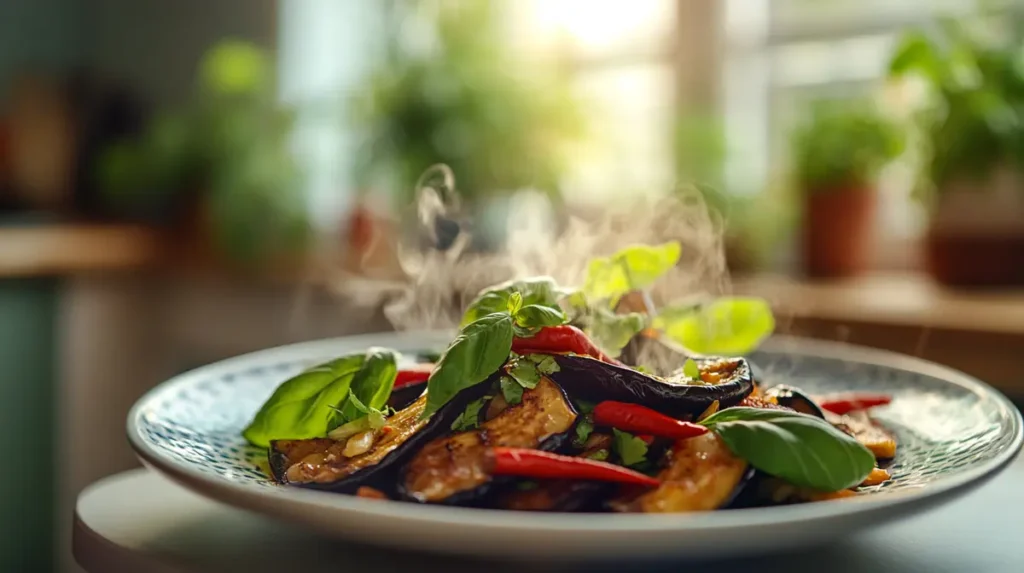
Ingredient Overview
Let’s delve into what makes this eggplant basil recipe truly special. The star ingredient is the aubergine, also known as Thai eggplant, which is renowned for its ability to soak up flavors. Here’s a closer look at the key components:
- Aubergines (Thai Eggplants): These small, round vegetables have a slightly bitter taste that becomes wonderfully tender when cooked.
- Fresh Basil Leaves: Thai basil is ideal for its unique flavor, but regular basil works well too.
- Garlic and Red Chilies: These add a spicy kick and depth of flavor, essential in basil eggplant Thai dishes.
- Soy Sauce and Oyster Sauce: They create a savory base that complements the aubergines perfectly.
- Palm Sugar: Adds a subtle sweetness to balance the spicy and salty elements.
Special Tips for This Recipe
Mastering the Perfect Thai Aubergine Dish
Creating the ultimate Thai aubergine recipe is simpler than you might think. Here are some expert tips to help you achieve the best results:
- Soak the Aubergines: After slicing, soak them in salted water for about 10 minutes. This helps remove any bitterness and keeps them from discoloring.
- Use High Heat: Stir-frying over high heat locks in flavors and gives the aubergines a delightful sear.
- Fresh Ingredients Matter: Using fresh basil and garlic enhances the authentic Thai flavors significantly.
- Adjust Spice to Taste: Feel free to modify the amount of chili peppers to suit your spice tolerance. Removing the seeds can make the dish milder.
- Balance the Flavors: Thai cuisine is all about harmony. Taste your dish as you cook and adjust the sweet, salty, and spicy elements as needed.
Ingredients
For the Stir-Fry:
- 3 medium Thai aubergines, sliced into bite-sized pieces
- 1 cup fresh Thai basil leaves
- 4 cloves garlic, minced
- 2 red bird’s eye chilies, thinly sliced
- 2 tablespoons vegetable oil
For the Sauce:
- 2 tablespoons soy sauce
- 1 tablespoon oyster sauce
- 1 tablespoon fish sauce (optional)
- 1 teaspoon palm sugar or brown sugar
- 2 tablespoons water
Optional Additions:
- 1 small onion, sliced
- 1 red bell pepper, sliced
Step-by-Step Directions
Step 1: Prepare the Aubergines
Begin by slicing the aubergines into uniform pieces. Place them in a bowl filled with cold water and a teaspoon of salt. Let them soak for about 10 minutes to reduce bitterness and prevent browning.
Step 2: Mix the Sauce
In a separate bowl, combine the soy sauce, oyster sauce, fish sauce (if you’re using it), palm sugar, and water. Stir until the sugar has fully dissolved, creating a smooth sauce.
Step 3: Sauté the Aromatics
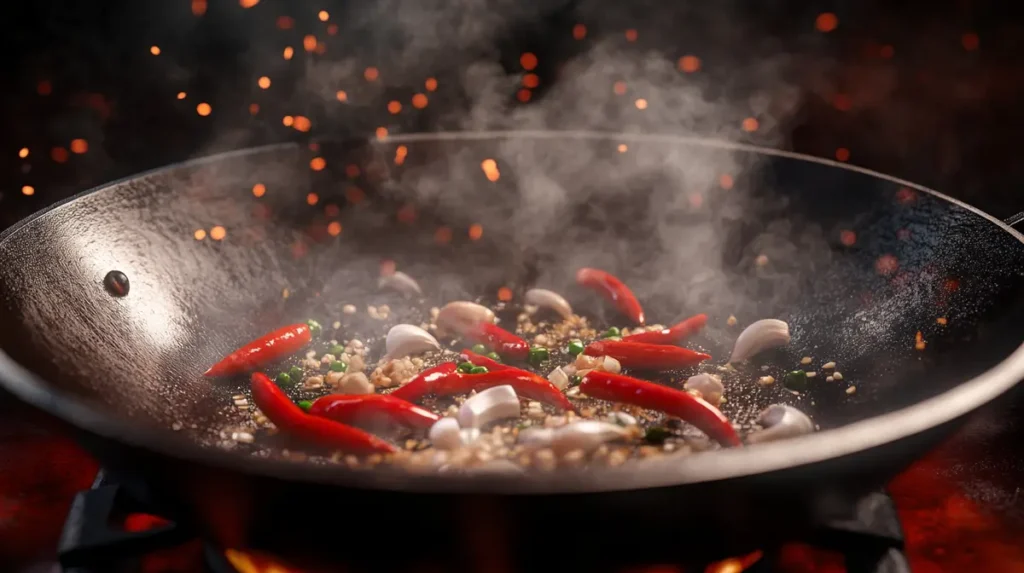
Heat the vegetable oil in a wok or large skillet over high heat. Add the minced garlic and sliced chilies to the hot oil. Stir-fry for about 30 seconds until they’re fragrant and slightly golden.
Step 4: Cook the Aubergines
Drain the soaked aubergines and pat them dry with a paper towel. Add them to the wok along with the optional sliced onions and bell peppers. Stir-fry everything for 5 to 7 minutes, or until the aubergines begin to soften and the vegetables develop a slight char.
Step 5: Add the Sauce
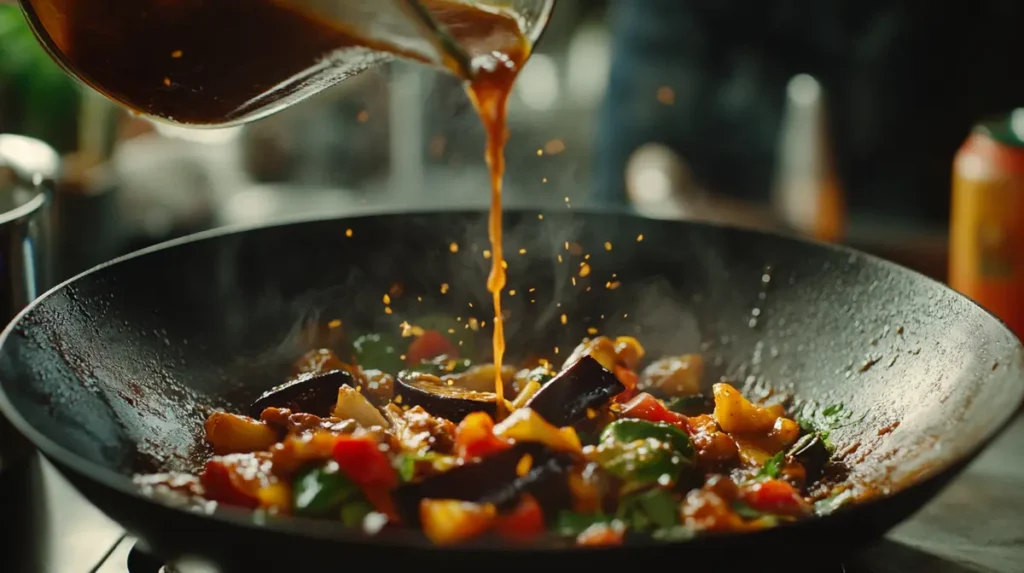
Pour the sauce mixture over the contents of the wok. Stir thoroughly to ensure that all the ingredients are evenly coated. Reduce the heat to medium and let the dish simmer for another 5 minutes, allowing the aubergines to become tender and absorb the flavors.
Step 6: Incorporate the Basil
Add the fresh Thai basil leaves to the wok. Stir-fry for an additional 1 to 2 minutes, just until the basil wilts and releases its aromatic fragrance.
Step 7: Serve the Dish
Transfer your Thai aubergine stir-fry to a serving plate. For an extra touch, garnish with additional basil leaves and sliced chilies. This dish pairs wonderfully with steamed jasmine rice.
Nutrition Facts (Per Serving)
- Calories: 180
- Fat: 9g
- Carbohydrates: 22g
- Protein: 4g
- Sugars: 8g
- Cholesterol: 0mg
- Sodium: 750mg
Tips for Success
To make sure your Thai aubergine recipe turns out perfectly every time, consider these additional tips:
- Prep Ahead: Since stir-frying is a quick process, have all your ingredients prepared and within reach before you start cooking.
- Avoid Overcrowding: If your wok is small, cook the aubergines in batches to ensure even cooking and proper caramelization.
- Use Suitable Oil: Opt for oils with a high smoke point, like vegetable or peanut oil, to handle the high heat of stir-frying.
- Season Gradually: It’s easier to add more seasoning than to fix an overly salty dish, so adjust as you go.
How to Store
Refrigerator
Allow any leftovers to cool completely before storing. Place them in an airtight container and refrigerate for up to 3 days.
Freezer
For longer storage, transfer the cooled dish to a freezer-safe container or a zip-lock bag. It can be frozen for up to 2 months without significant loss of flavor or texture.
To Reheat
When you’re ready to enjoy the leftovers, reheat them gently in a skillet over medium heat. You may add a splash of water to prevent sticking. Alternatively, you can microwave the dish on medium power until it’s heated through.
Substitutions and Variations
Make It Vegetarian
To adapt this basil eggplant dish for vegetarians:
- Omit Fish Sauce: Leave out the fish sauce and replace it with extra soy sauce or a dash of vegetarian mushroom sauce.
- Use Vegetarian Oyster Sauce: Opt for a plant-based oyster sauce alternative made from mushrooms.
Experiment With Protein
Add Tofu
Incorporate firm tofu to boost the protein content:
- Cut the tofu into cubes and pat dry.
- Stir-fry the tofu until golden brown before adding the aubergines.
Include Chicken or Shrimp
For a non-vegetarian twist:
- Thinly slice chicken breast or use peeled shrimp.
- Cook them after sautéing the aromatics and before adding the aubergines, ensuring they’re fully cooked.
Experiment With Vegetables
Enhance with More Veggies
Add a variety of vegetables for extra nutrition and flavor:
- Snap Peas: Provide a nice crunch.
- Broccoli Florets: Add texture and absorb the sauce well.
- Carrots: Offer sweetness and color.
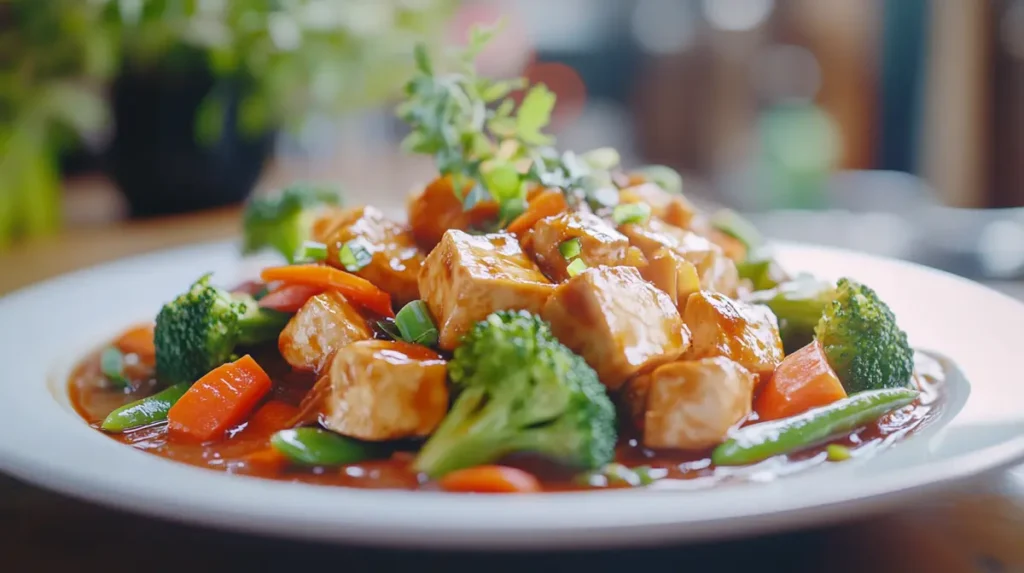
Frequently Asked Questions (FAQ)
Q: Can I use regular eggplants instead of Thai aubergines?
A: Yes, you can substitute regular eggplants. Just cut them into smaller pieces, and be aware that they may require a slightly longer cooking time to become tender.
Q: What if I can’t find palm sugar?
A: Brown sugar or even white granulated sugar can be used as a substitute for palm sugar without significantly altering the flavor.
Q: Is this dish very spicy?
A: The spice level is moderate, but you can adjust it by adding more or fewer chili peppers. Removing the seeds and membranes from the chilies will also reduce the heat.
Q: Can I prepare any part of this dish ahead of time?
A: Absolutely! You can prepare the sauce and chop the vegetables in advance. Store the sliced aubergines in water to prevent them from browning.
Q: What type of basil should I use?
A: Thai basil is preferred for its distinct flavor, but if it’s not available, sweet basil or even holy basil can be used as alternatives.
Conclusion
You’ve just discovered how to bring a taste of Thailand into your home with this ultimate Thai aubergine recipe. It’s a dish that combines simplicity with exotic flavors, making it perfect for both weeknight dinners and special occasions. So why not give it a try? We’d love to hear how your culinary adventure turns out. Share your results, leave a comment, or subscribe for more exciting recipes that will take your cooking to new heights.
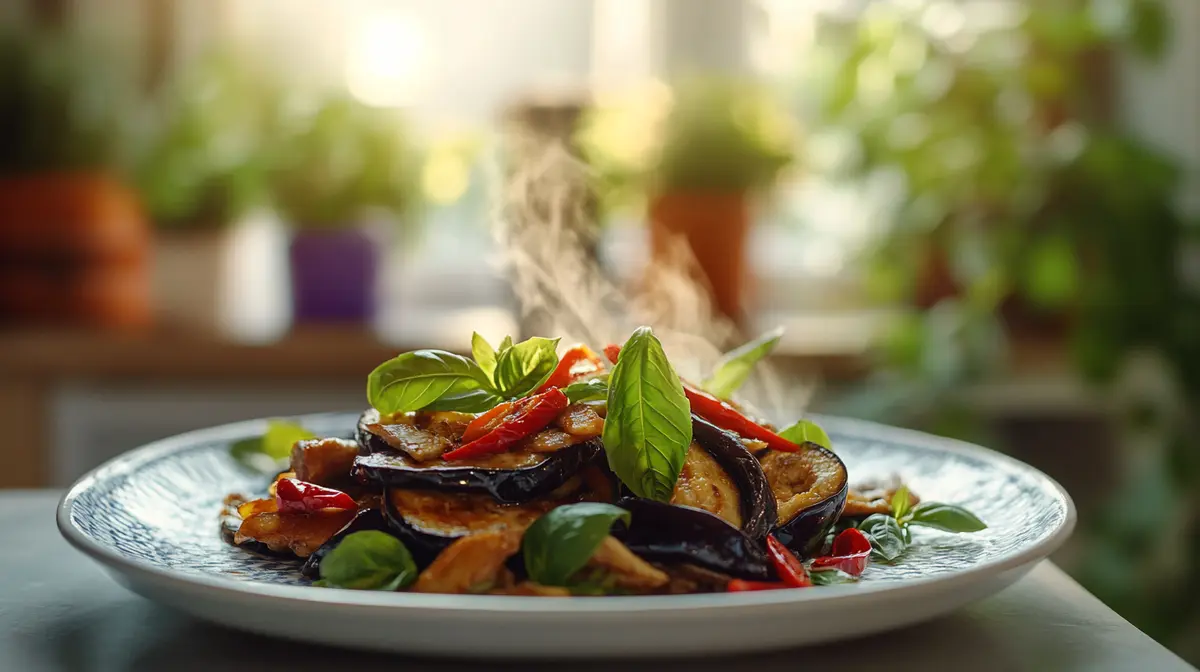
The Ultimate Thai Aubergine Recipe: A Flavor Journey You Won’t Forget
Ingredients
- 3 medium Thai aubergines sliced into bite-sized pieces
- 1 cup fresh Thai basil leaves
- 4 cloves garlic minced
- 2 red bird’s eye chilies thinly sliced
- 2 tablespoons vegetable oil
- 2 tablespoons soy sauce
- 1 tablespoon oyster sauce
- 1 tablespoon fish sauce optional
- 1 teaspoon palm sugar or brown sugar
- 2 tablespoons water
- 1 small onion sliced (optional)
- 1 red bell pepper sliced (optional)
Instructions
- Slice the aubergines and soak them in salted water for 10 minutes.
- Mix soy sauce, oyster sauce, fish sauce, palm sugar, and water in a small bowl.
- Heat vegetable oil in a wok over high heat, then add garlic and chilies.
- Stir-fry the garlic and chilies for about 30 seconds until fragrant.
- Drain and dry the aubergines, then add them, onions, and bell peppers to the wok.
- Stir-fry for 5-7 minutes until the aubergines soften and the vegetables char slightly.
- Pour the sauce mixture over the ingredients in the wok and stir well.
- Reduce the heat to medium and simmer for 5 minutes until the aubergines are tender.
- Add fresh basil leaves and stir-fry for another 1-2 minutes until the basil wilts.
- Serve hot with jasmine rice, garnished with extra basil and chili slices.
